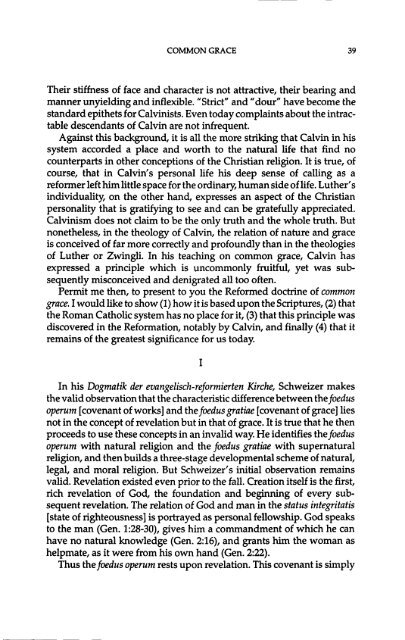Herman-Bavinck-Common-Grace
You also want an ePaper? Increase the reach of your titles
YUMPU automatically turns print PDFs into web optimized ePapers that Google loves.
COMMON GRACE 39<br />
Their stiffness of face and character is not attractive, their bearing and<br />
manner unyielding and inflexible. "Strict" and "dour" have become the<br />
standard epithets for Calvinists. Even today complaints about the intractable<br />
descendants of Calvin are not infrequent.<br />
Against this background, it is all the more striking that Calvin in his<br />
system accorded a place and worth to the natural life that find no<br />
counterparts in other conceptions of the Christian religion. It is true, of<br />
course, that in Calvin's personal life his deep sense of calling as a<br />
reformer left him little space for the ordinary, human side of life. Luther's<br />
individuality, on the other hand, expresses an aspect of the Christian<br />
personality that is gratifying to see and can be gratefully appreciated.<br />
Calvinism does not claim to be the only truth and the whole truth. But<br />
nonetheless, in the theology of Calvin, the relation of nature and grace<br />
is conceived of far more correctly and profoundly than in the theologies<br />
of Luther or Zwingli. In his teaching on common grace, Calvin has<br />
expressed a principle which is uncommonly fruitful, yet was subsequently<br />
misconceived and denigrated all too often.<br />
Permit me then, to present to you the Reformed doctrine of common<br />
grace. I would like to show (1) how it is based upon the Scriptures, (2) that<br />
the Roman Catholic system has no place for it, (3) that this principle was<br />
discovered in the Reformation, notably by Calvin, and finally (4) that it<br />
remains of the greatest significance for us today.<br />
I<br />
In his Dogmatik der evangelisch-reformierten Kirche, Schweizer makes<br />
the valid observation that the characteristic difference between the foedus<br />
operum [covenant of works] and the foedus gratiae [covenant of grace] lies<br />
not in the concept of revelation but in that of grace. It is true that he then<br />
proceeds to use these concepts in an invalid way. He identifies the foedus<br />
operum with natural religion and the foedus gratiae with supernatural<br />
religion, and then builds a three-stage developmental scheme of natural,<br />
legal, and moral religion. But Schweizer's initial observation remains<br />
valid. Revelation existed even prior to the fall. Creation itself is the first,<br />
rich revelation of God, the foundation and beginning of every subsequent<br />
revelation. The relation of God and man in the status integritatis<br />
[state of righteousness] is portrayed as personal fellowship. God speaks<br />
to the man (Gen. 1:28-30), gives him a commandment of which he can<br />
have no natural knowledge (Gen. 2:16), and grants him the woman as<br />
helpmate, as it were from his own hand (Gen. 2:22).<br />
Thus the foedus operum rests upon revelation. This covenant is simply



